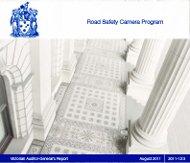6/28/2012
Australia: Speed Camera Safety and Accuracy QuestionedSafety value and reliability of speed cameras comes under question in Australia.

Speed cameras are coming under fire in Australia. The Australian Capital Territory's political opposition on Monday questioned the Labor government's use of speed cameras after new evidence suggests the devices have failed to reduce accidents. In Victoria, a government audit released last year confirmed the potential for serious errors in photo tickets.
To prove their point, Canberra Liberals used freedom of information requests to document the performance of the automated ticketing machines at eight locations between 2002 and 2011. Fixed cameras were installed at each between 2007 and 2008.
"Overall, accidents have increased by 40 per cent at fixed speed camera sites, while revenue continues to rise in the millions of dollars," ACT Shadow Urban Services Minister Alistair Coe said in a statement. "It's clear that instead of installing fixed speed cameras in places that will raise the most revenue, the government should be taking an evidence-based approach to road safety."
At two of the eight locations, the average number of accidents decreased in the three or four years after the cameras were installed. At one location, the figures stayed roughly the same, and five locations saw an increase. There were an average of 55 accidents per year with cameras compared to 39 without them -- a 29 percent increase.
In the state of Victoria, the auditor general did not share the skepticism about photo ticketing's effectiveness. In an August 2011 report, the auditor confirmed the difficulty involved in ensuring photo enforcement citations are accurate. Ultimately, the report came to the defense of the program that issued 1,156,673 speed camera and 147,505 red light camera tickets in 2010. The state government pocketed a total of $229.4 million from tickets that run between $153 and $611 each, with license points.
"The camera system is complex, with many interacting components and pieces of equipment," the report states.
The auditor identified the three main phases involved in ensuring reliability. In the procurement stage, officials must ensure the devices that are purchased meet high standards. Next, there must be ongoing maintenance and testing of the equipment. Finally, there must be a process in place for detecting faults and equipment degradation.
For procurement testing, the state requires a fixed speed camera be tested against another radar or laser unit measuring at least 100,000 vehicles over 30 days. The system must also be checked against calibrated speedometers. Tests must also be made in varying weather and temperature extremes.
Various ongoing checks are also performed on a monthly, quarterly and annual basis. Mobile cameras must be checked for proper alignment to the road. When placed, camera operators must confirm that there are no metal objects that could create a "Double Doppler" effect to boost the speed reading.
Despite the verification systems, the devices have still failed on multiple occasions. In October 2010, police impounded a 20-year-old woman's 84-horsepower economy car over a bogus ticket issued on the Hume Highway that claimed she had been driving well in excess of the speed limit. The auditor explained what happened.
"Over a period of time, all computer clocks can drift away from the true time," the report stated. "Computer clocks are corrected periodically from an external source. The normal drift in the camera clock has no effect on the accuracy of speed measurements taken over the short time required to travel between two camera sites. However, when an incident is detected at the instant a camera clock is resynchronized, the time correction may result in the traveling speed being recorded as higher than the actual speed."
The auditor admitted that the checks and balances in the system often relied on accepting the word of the mobile camera van driver.
"Validation that the operator conducted the corroboration check, such as photographic evidence of the check being conducted, would give additional assurance and strengthen public confidence in the validity of infringements issued from mobile cameras," the report recommended.
A copy of the Victoria audit report is available in a 2mb file at the source link below.


